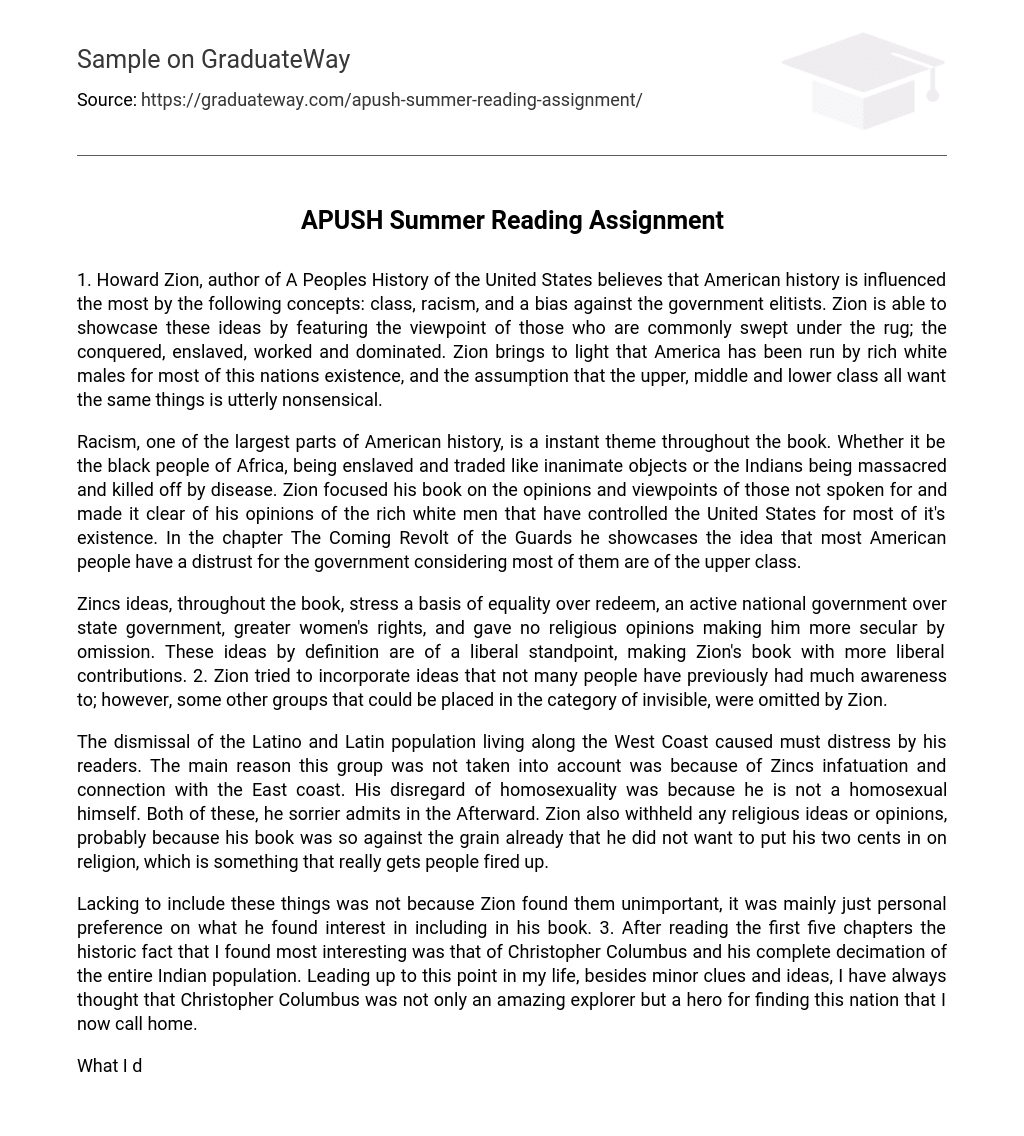1. Howard Zion, author of A Peoples History of the United States believes that American history is influenced the most by the following concepts: class, racism, and a bias against the government elitists. Zion is able to showcase these ideas by featuring the viewpoint of those who are commonly swept under the rug; the conquered, enslaved, worked and dominated. Zion brings to light that America has been run by rich white males for most of this nations existence, and the assumption that the upper, middle and lower class all want the same things is utterly nonsensical.
Racism, one of the largest parts of American history, is a instant theme throughout the book. Whether it be the black people of Africa, being enslaved and traded like inanimate objects or the Indians being massacred and killed off by disease. Zion focused his book on the opinions and viewpoints of those not spoken for and made it clear of his opinions of the rich white men that have controlled the United States for most of it’s existence. In the chapter The Coming Revolt of the Guards he showcases the idea that most American people have a distrust for the government considering most of them are of the upper class.
Zincs ideas, throughout the book, stress a basis of equality over redeem, an active national government over state government, greater women’s rights, and gave no religious opinions making him more secular by omission. These ideas by definition are of a liberal standpoint, making Zion’s book with more liberal contributions. 2. Zion tried to incorporate ideas that not many people have previously had much awareness to; however, some other groups that could be placed in the category of invisible, were omitted by Zion.
The dismissal of the Latino and Latin population living along the West Coast caused must distress by his readers. The main reason this group was not taken into account was because of Zincs infatuation and connection with the East coast. His disregard of homosexuality was because he is not a homosexual himself. Both of these, he sorrier admits in the Afterward. Zion also withheld any religious ideas or opinions, probably because his book was so against the grain already that he did not want to put his two cents in on religion, which is something that really gets people fired up.
Lacking to include these things was not because Zion found them unimportant, it was mainly just personal preference on what he found interest in including in his book. 3. After reading the first five chapters the historic fact that I found most interesting was that of Christopher Columbus and his complete decimation of the entire Indian population. Leading up to this point in my life, besides minor clues and ideas, I have always thought that Christopher Columbus was not only an amazing explorer but a hero for finding this nation that I now call home.
What I did not realize though, was the magnitude of his actions. Columbus always saw the Indians as nothing more than property. He would take Indians captive and force them to find gold, the Indians had to find certain amount of gold every three months, in an area where gold was very scarce, and if they did not there is a good chance that there hands would be cut off. The enslavement, murder, and mutilation of hundreds of thousands of Indians would just be the beginning.
Through further murder and the spread of infectious disease the whole Indian population would be pretty much wiped out. Zion imposing this Marxist viewpoint on his readers gives them a look at the Indians struggle with the colonization of America. Zion finally gives explanation as to why such a populated, powerful and widespread group of people would be n the verge of extinction in the modern age. Zion’s portrayal of American history has changed my perspective on how America really did become the place call home. 4.
Zion believes that there is a bias in every piece of history and in every fact because no fact is completely pure. The facts presented by writers, teachers and historians are ones that they have deemed worthy of being presented, making it utterly impossible to create a work that is not bias. Their work is in correlation with their interests, which I believe is a better way to learn about history, from multiple viewpoints. Zion chooses to aim his facts to increase the wariness of class distinctions, racial injustice, sexuality inequality and national arrogance.
A piece of writing is always better and more interesting when you can tell the author really stood by what they were writing. So yes, I do agree with Zion’s viewpoint, every author has had their own experiences and their own curiosities, and those will show up in their writing. Unfortunately, practicing this opinion does have its downfalls. In the omission of facts Zincs primary fear is not that it will disfigure the telling of the past, but may alter peoples opinions on what is going on in the present.





